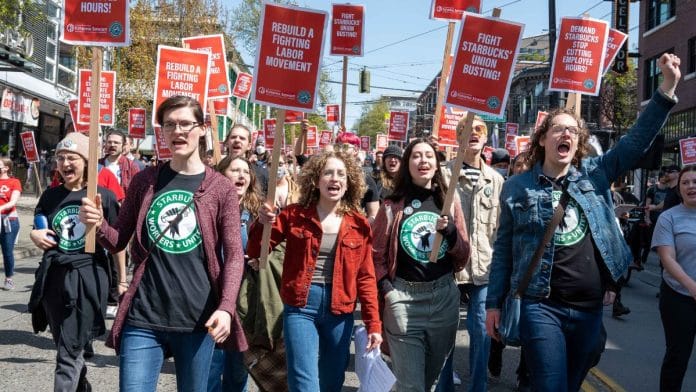New Delhi: During Starbucks’ busiest week of the year, baristas in New York joined colleagues nationwide on the fifth day of a swelling strike that has now reached over 40 cities and 65 unionised stores. More than a thousand workers walked off the job demanding a first-ever union contract that would address pay, staffing shortages, and dozens of unresolved labour-practice cases.
The campaign gained a political jolt on 14 November, when New York’s Mayor-elect Zohran Mamdani publicly urged residents to boycott Starbucks in solidarity with the baristas.
“While workers are on strike, I won’t be buying any Starbucks, and I’m asking you to join us,” Mamdani wrote, converting the strike into a high-profile political movement.
The strike coincides with Starbucks’ busiest annual ‘Red Cup Day’ promotion. Every November, the company banks on the giveaway of free reusable holiday cups to draw never-ending lines of customers. But this year, more than 1,000 baristas walked off the job, making it one of the largest labour actions in Starbucks history.
The numbers kept shifting. Sixty five stores at first, with dozens more preparing to join. Starbucks insisted that 99.9 per cent of its shops remained open, but the workers countered it saying the pressure was only beginning.
Over 45 major labour unions and organisations representing more than 85 million people have sent a letter to Starbucks CEO Brian Niccol, demanding a fair contract and pledging not to cross picket lines if the strike continues.
Support has also come from prominent political figures. Seattle Mayor-elect Katie Wilson joined rallies with striking workers, urging local customers to boycott Starbucks in solidarity. The city is the birthplace of the coffee chain. On X, Senator Bernie Sanders added his voice, writing, “I stand in solidarity with the Starbucks workers on strike. When a corporation can pay $96 million to its CEO for just four months of work, it can afford to pay its workers a living wage and decent benefits.”
Also read: Zohran Mamdani’s New York win revives a forgotten history — of Gujarati Muslim cosmopolitanism
At the picket lines
At stores across major cities, lines of baristas chanted, “No contract, no coffee,” marching with cardboard signs, and demanding better pay and stable hours, and an end to what they describe as aggressive anti-union tactics.
For Mamdani, publicly aligning with them was an early demonstration of how he might use his seat once in office: Loudly and unapologetically on the side of low-wage workers.
Boycotts have shaped US labour history for decades, but this one has a cultural weight. Starbucks has always been more than just a coffee chain, it’s an icon of American consumerism, social branding, and urban life.
Since 2021, at least 350-366 Starbucks stores have unionised, igniting a persistent struggle between workers seeking contracts and a company accused of stalling–claims Starbucks denies.
But what makes the 2025 Boycott different is how multiple political and cultural currents converge. Labour demands over pay and schedules have been combined with public scrutiny of Starbucks’s position on issues like Palestine and corporate governance.
For democratic socialist Mamdani, asking New Yorkers to skip a brand seen on almost every Manhattan corner was a message to progressive movements seeking allies in office.
Also read: Zohran Mamdani is an authentic representation of modern India
Politics behind the coffee cup
On the surface, the strike is about workplace conditions. Starbucks insists it bargains in good faith and offers competitive wages. But the workers say the company retaliates against organisers and stalls negotiations.
Beneath the strike lies a deeper political story: The lingering fallout from Starbucks’ 2023 clash with its union over the Israel-Hamas war. When the union posted—and then deleted—“Solidarity with Palestine!” with a controversial image, Starbucks sued for trademark harm and the union countersued. The dispute sparked competing boycotts, accusations from both sides, and a wave of vandalism that hurt the company’s reputation.
By 2024, Starbucks faced protests from all directions and falling holiday sales. The 2025 “Red Cup Rebellion” erupted against this backdrop, combining labour unrest with geopolitical tensions.
Support has come from figures like Senator Elizabeth Warren and FTC chair Lina Khan, while the Service Employees International Union and its unions frame it as a part of a broader worker-power resurgence.
Grassroot groups–student groups, Muslim organisations, and solidarity coalitions–have already been boycotting Starbucks over Palestine, making this strike another pressure point.
Right-wing politicians meanwhile have called for anti-Starbucks boycotts, and business commentators argue that politically driven boycotts mainly hurt workers.
(Edited by Theres Sudeep)






